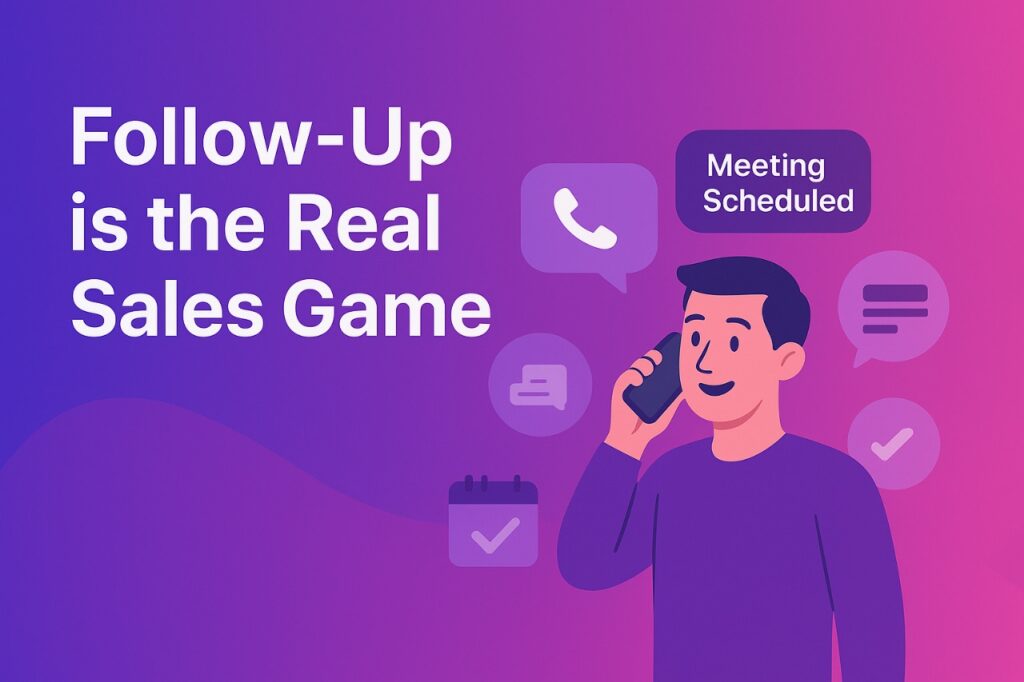Sales is often compared to a game. You need strategy, patience, timing, and execution. But unlike other games, there is one rule in sales that’s non-negotiable: you cannot win without follow-ups.
A new lead might excite you, a pitch might energize you, but if you don’t follow up properly, all the effort is wasted. In fact, most deals aren’t lost because of pricing or competition; they’re lost because someone failed to follow up at the right time.
Why Follow-Ups Are the Backbone of Sales
A common myth in sales is that if a client is genuinely interested, they will call back. Reality check? That almost never happens. Clients are busy. They have hundreds of tasks, other vendors, and daily pressures. Your solution may be perfect for them, but if you don’t remind them at the right time, you get forgotten.
Here’s what the data says:
- 80% of sales require at least 5 follow-ups, yet most salespeople stop after 1 or 2.
- 92% of salespeople give up after the 4th attempt, but 80% of prospects say “yes” only after the 5th attempt.
- Following up within the first 5 minutes of inquiry makes you 9x more likely to convert compared to waiting an hour.
The numbers prove it fortune is in the follow-up.
The Human Psychology of Follow-Up
Let’s go beyond stats for a moment. Why does follow-up work? Because it’s rooted in basic human psychology.
When a client says:
- “Call me after 2 days”
- “Let’s talk next week”
- “I’ll decide after checking with my team”
…they’re essentially testing you. They’re checking your reliability before making a decision.
Imagine this:
- If you call late → They feel ignored. Their thought: “If they can’t respect my time before I become a client, how will they behave after I pay?”
- If you call early, → They feel rushed. Their thought: “They don’t listen, they just push their agenda.”
- If you call exactly on time → They feel respected. Their thought: “They value me, they’re professional, I can trust them.”
This single action builds or breaks trust. And in business, trust is more powerful than features or discounts.
Follow-Up as a Relationship Tool
Follow-ups are not only about chasing sales. They are about nurturing relationships. Even if the client doesn’t buy immediately, your discipline in following up leaves a lasting impression.
Consider this:
- A client might reject you today, but remember your professionalism and come back six months later.
- Another might not need your service right now, but recommend you to a colleague because of how reliable you seemed.
- A simple WhatsApp message or email at the promised time can keep your brand alive in their memory long after the call.
In fact, 65% of a company’s business comes from referrals and repeat clients. And both of these depend heavily on how clients feel about your approach.
The Discipline Behind Great Follow-Ups
Follow-ups test your patience and discipline more than your sales pitch. The best salespeople don’t just rely on memory, they create a system.
Here are some proven strategies:
- Document Everything Immediately
Don’t assume you’ll remember. The moment a client says, “Call me Tuesday at 3 PM,” write it down. - Leverage CRM & Automation
Tools like Quickest CRM remind you at the right time, so you never miss a client’s deadline. Automation ensures consistency even on your busiest days. - Personalize Your Follow-Up
Don’t just say, “I’m following up.” Remind them of their problem and position yourself as the solution.
Example: “Last time you mentioned delays in reporting. I’d love to show how we can automate that for you.” - Choose the Right Channel
Some clients prefer calls, others like email or WhatsApp. Respecting their preference shows attentiveness. - Balance Persistence with Respect
Follow-up doesn’t mean hounding a client. The golden rule: persistent, not pushy.
The ROI of a Single Call
Salespeople often underestimate how much impact a single timely follow-up can have. Here’s what studies reveal:
- 60% of customers say “no” four times before they say “yes.”
- 48% of salespeople never make a single follow-up attempt.
- Companies that excel at lead nurturing generate 50% more sales-ready leads at a 33% lower cost.
This means that the salesperson who simply keeps showing up at the right time automatically has an edge over competitors.
Small Habits, Big Results
Follow-ups are not about grand gestures; they’re about small, consistent habits:
- Noting the client’s preferred time.
- Calling exactly when promised.
- Sending a quick summary email after a conversation.
- Checking in a week later, even if they didn’t respond.
Over time, these micro-actions build a macro-result: clients who trust you, buy from you, and recommend you.
Follow-Up = Respect + Growth
At its heart, follow-up is not just a sales tactic. It’s a language of respect. It tells the client: “Your time matters. Your business matters. You matter.”
And when clients feel that way, sales no longer feel like sales. They feel like partnerships.
So the next time someone says, “Call me in 2 days,” don’t shrug it off. Take it as the most important test of your professionalism. Because sometimes, one disciplined call can bring you not just a customer, but a lifelong advocate.
If you’d like to see how Quickest CRM makes follow-ups effortless, from automated reminders to structured timeline, book a demo here. We’ll show you how simple habits can bring extraordinary growth.

